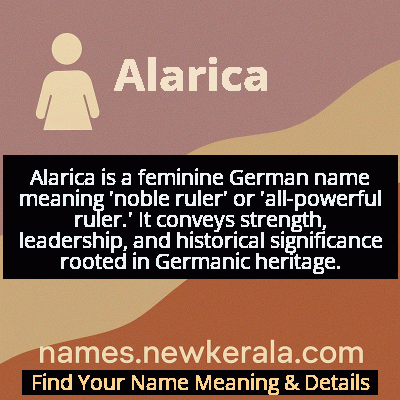Alarica Name Meaning & Details
Origin, Popularity, Numerology Analysis & Name Meaning of Alarica
Discover the origin, meaning, and cultural significance of the name ALARICA. Delve into its historical roots and explore the lasting impact it has had on communities and traditions.
Name
Alarica
Gender
Female
Origin
German
Lucky Number
9
Meaning of the Name - Alarica
Alarica is a feminine German name meaning 'noble ruler' or 'all-powerful ruler.' It conveys strength, leadership, and historical significance rooted in Germanic heritage.
Alarica - Complete Numerology Analysis
Your Numerology Number
Based on Pythagorean Numerology System
Ruling Planet
Mars
Positive Nature
Generous, passionate, energetic, and humanitarian.
Negative Traits
Impulsive, impatient, moody, and can be overly emotional.
Lucky Colours
Red, maroon, scarlet.
Lucky Days
Tuesday.
Lucky Stones
Red coral, garnet.
Harmony Numbers
1, 2, 3, 6.
Best Suited Professions
Military, sports, philanthropy, leadership roles.
What People Like About You
Courage, energy, leadership, generosity.
Famous People Named Alarica
Alarica of the Visigoths
Historical Figure
Daughter of Visigothic king Alaric I, known for her noble lineage during the migration period
Alarica von Hessen
Noblewoman
German aristocrat known for her patronage of arts and education in Hesse region
Alarica Schmidt
Academic Historian
Renowned scholar of Germanic history and women's roles in medieval societies
Name Variations & International Equivalents
Click on blue names to explore their detailed meanings. Gray names with will be available soon.
Cultural & Historical Significance
The feminine form Alarica specifically honors the legacy of Alaric I, the famous Visigothic king who sacked Rome in 410 AD, suggesting a namesake of strength and historical significance. In Germanic cultural contexts, the name carries connotations of ancient royal lineages and the preservation of tribal identity during times of great historical transition. The name represents a bridge between ancient Germanic traditions and the development of medieval European aristocracy, maintaining cultural continuity across centuries of social and political change.
Extended Personality Analysis
Women named Alarica are often perceived as possessing natural leadership qualities combined with a strong sense of tradition and heritage. They typically exhibit confidence, determination, and strategic thinking—traits that align with the name's meaning of 'all ruler.' Their personality often blends traditional values with modern independence, creating individuals who are both grounded and forward-thinking.
Alaricas tend to be protective of those they care about, showing loyalty and strength in relationships. They often possess a quiet authority that commands respect without being overbearing, and their decision-making reflects both wisdom and practicality. Many display a keen interest in history, culture, and preserving family traditions while simultaneously embracing contemporary opportunities for personal and professional growth. This balance between reverence for the past and engagement with the present makes them particularly effective in roles requiring both historical perspective and modern application.
Modern Usage & Popularity
In contemporary times, Alarica remains a rare but meaningful choice, particularly among families with German or Scandinavian heritage seeking to honor their ancestral roots. The name has seen a slight resurgence in recent years as part of the trend toward unique historical names with strong meanings. While not appearing on mainstream popularity charts, it maintains a steady presence in academic and historically-minded communities. Modern Alaricas often appreciate the name's distinctive quality and the connection to powerful female figures in history, with usage concentrated in Germany, Austria, and among diaspora communities preserving cultural identity through naming traditions.
Symbolic & Spiritual Meanings
Symbolically, Alarica represents the union of comprehensive authority with feminine strength, embodying the concept of wholeness and complete governance that suggests someone who can oversee all aspects of life with wisdom and balance. Metaphorically, it connects to themes of heritage preservation, cultural continuity, and the transmission of ancient wisdom through generations, carrying the symbolic weight of bridges between past and present while suggesting a person who can navigate complex situations with the authority of historical perspective while maintaining contemporary relevance.

